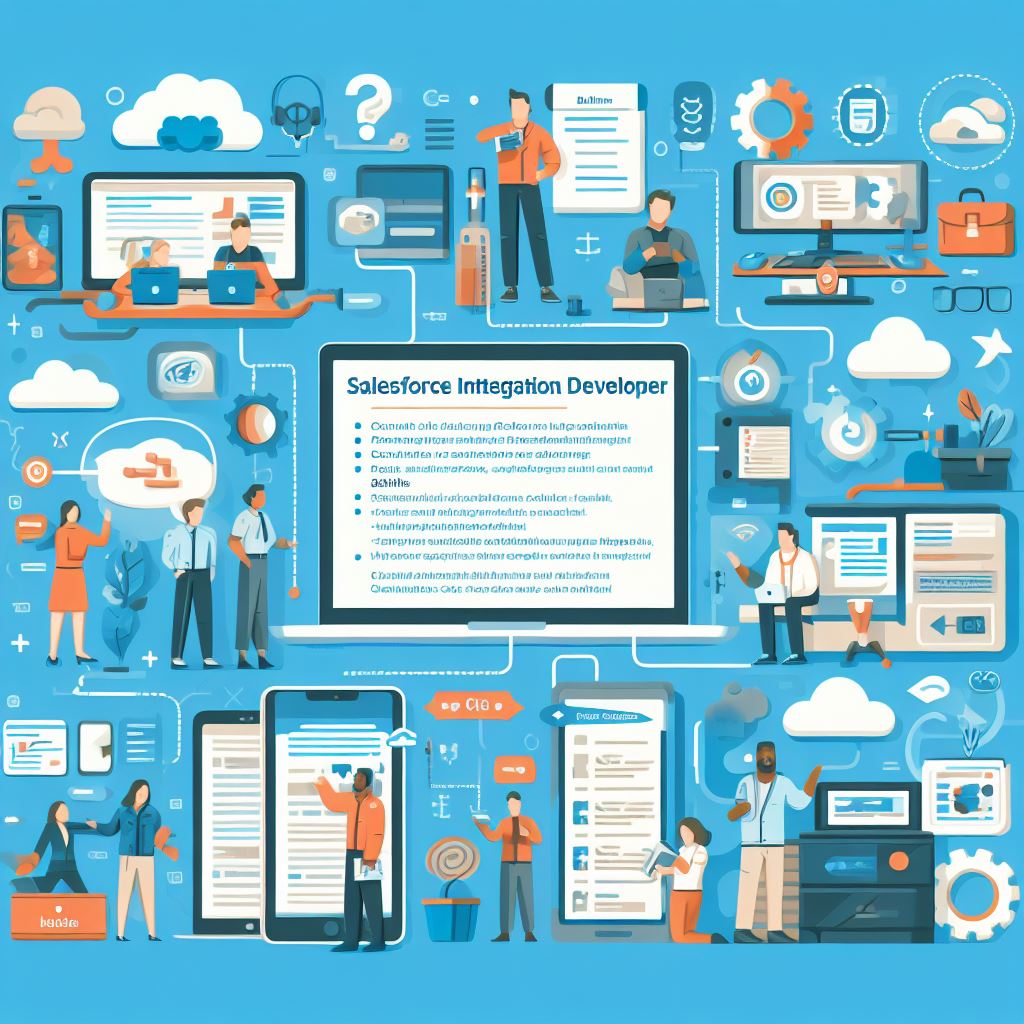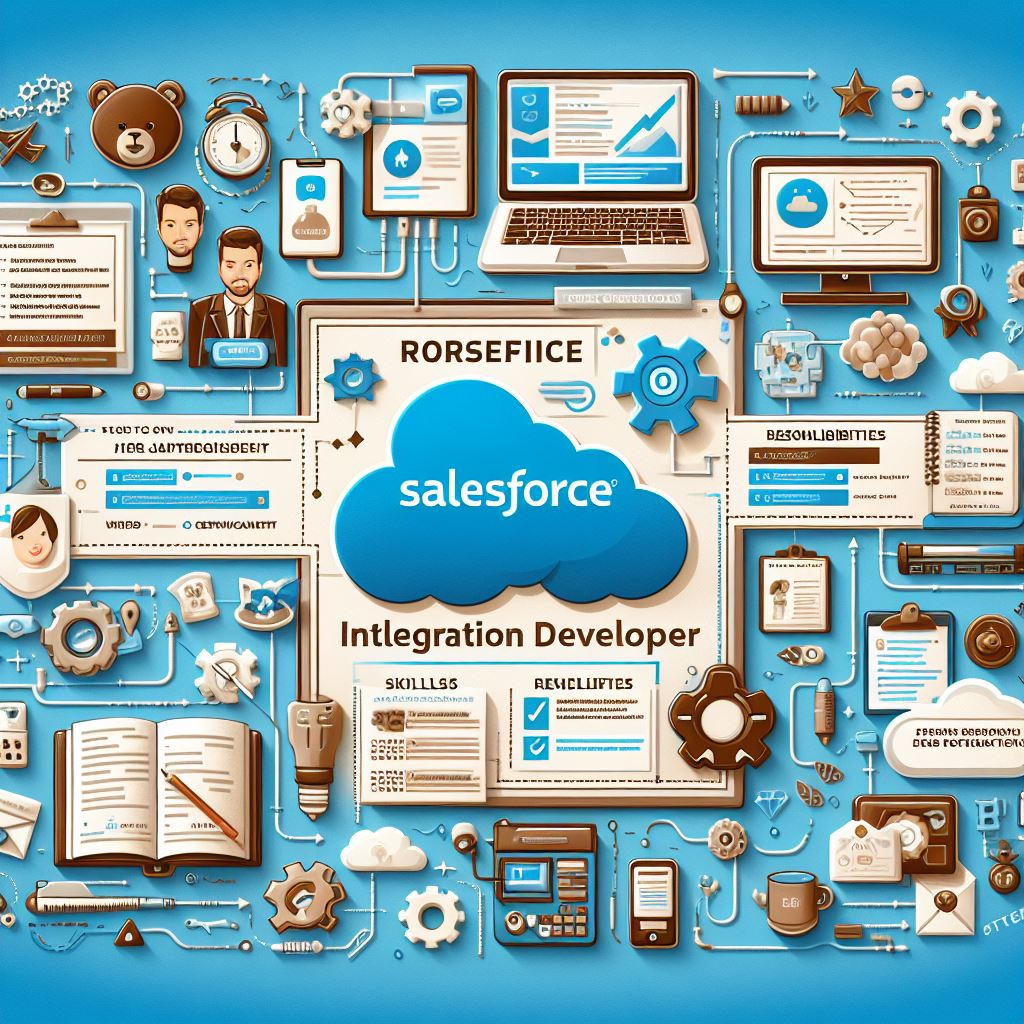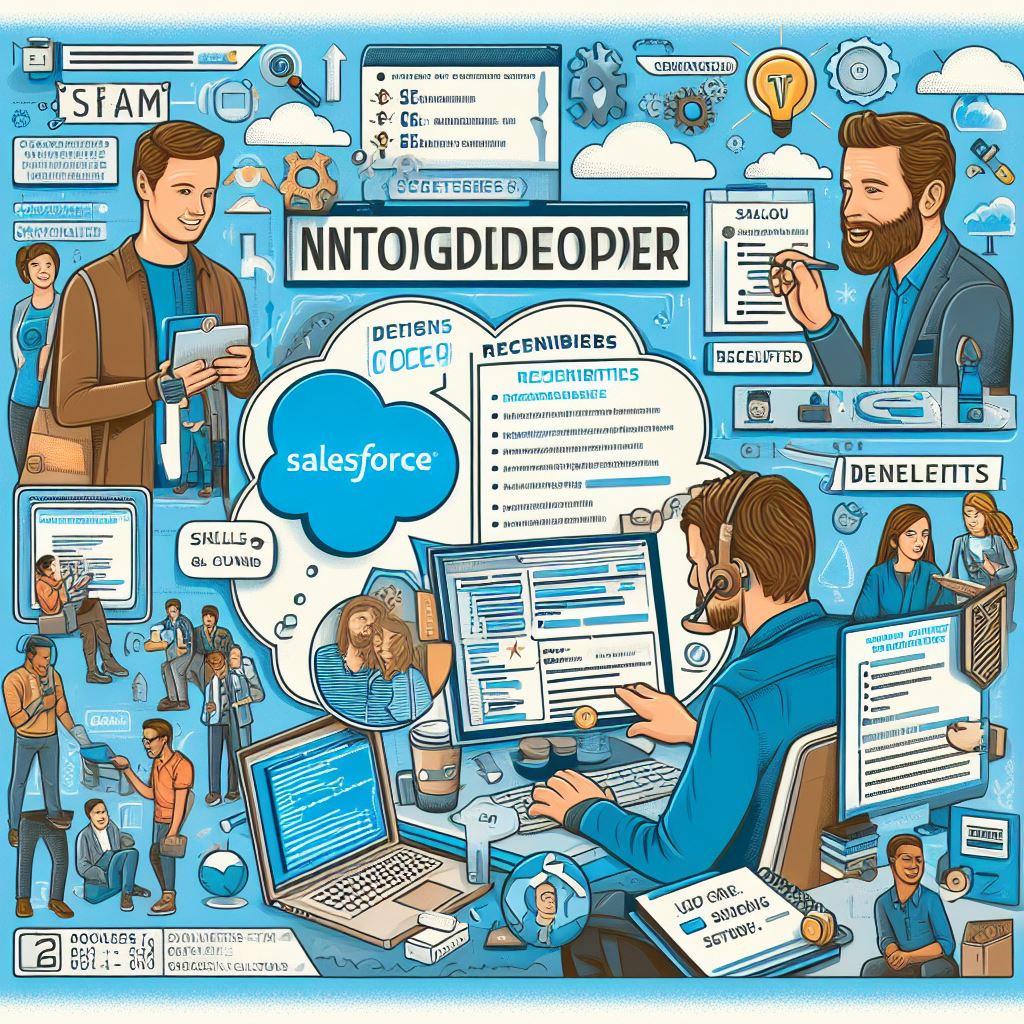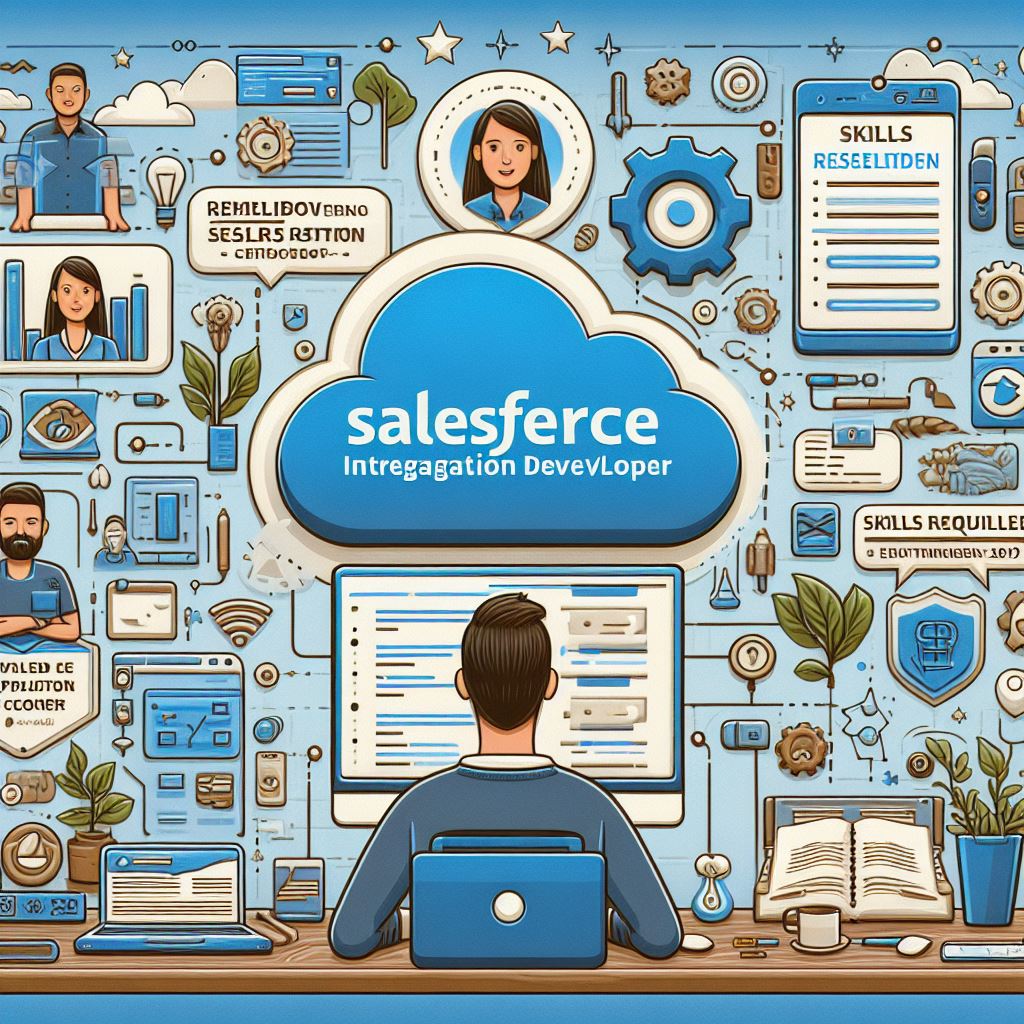Salesforce is a widely used CRM platform for managing sales, marketing, and customer service operations for businesses of all sizes. As more businesses turn to Salesforce to streamline their processes, the demand for skilled Salesforce integration developers is increasing.
But what exactly is a Salesforce integration developer, and how can you become one? In this blog post, we’ll dive into the role of a Salesforce integration developer, their responsibilities, and the skills and qualifications needed to excel in this field. Whether you’re considering a career change or looking to advance in your current role, read on to learn more about this in-demand job and how you can become a Salesforce integration developer.
Contents
- 1 Table of Contents
- 2 What is a Salesforce Integration Developer?
- 3 Skills and Qualifications Required
- 4 How to Become a Salesforce Developer | Realistic Path to becoming a Salesforce Developer
- 5 How to Become a Salesforce Integration Developer
- 6 Frequently Asked Questions (FAQs)
- 6.1 What is the difference between a Salesforce integration developer and a Salesforce administrator?
- 6.2 What programming languages do I need to know to become a Salesforce integration developer?
- 6.3 Do I need a Salesforce certification to become a Salesforce integration developer?
- 6.4 Can I become a Salesforce integration developer without any prior experience?
- 7 Conclusion
Table of Contents
What is a Salesforce Integration Developer?
Salesforce integration developers are like the unsung heroes of the Salesforce world – working behind the scenes to ensure that businesses can seamlessly connect their CRM with other systems and applications. Companies can improve efficiency by streamlining processes with data flow between platforms.
But what sets a Salesforce integration developer apart from other software engineers? Well, they possess a unique blend of skills and qualifications that make them experts in integrating Salesforce with third-party tools and platforms.
From their in-depth knowledge of APIs and programming languages to their strong analytical and problem-solving abilities, Salesforce integration developers have a comprehensive understanding of the technical aspects of data integration. But it’s not just about the technical skills – A successful Salesforce integration developer must be passionate about learning and keeping up with the latest technologies and trends.
A successful Salesforce integration developer must be passionate about learning and keeping up with the latest technologies and trends. They actively seek out new challenges to expand their knowledge and hone their skills.
Becoming a Salesforce integration developer requires a combination of dedication, experience, and continuous learning. So, next time you’re enjoying the seamless integration of your Salesforce data with other systems, remember to give a nod of appreciation to the hardworking integration developer behind the scenes.

Definition and Role
Salesforce integration developers connect Salesforce with other systems and applications to flow data seamlessly. Their expertise in APIs and data mapping allows for efficient and secure integrations, while their troubleshooting skills ensure smooth functioning. To become a Salesforce integration developer, a deep understanding of Salesforce, integration technologies, and programming languages is essential.
With experience, certifications, and a thirst for continuous learning, you can join the ranks of these in-demand professionals and make a valuable impact on businesses using Salesforce.
Responsibilities
A Salesforce integration developer is a specialized software engineer responsible for connecting Salesforce with other systems and applications. They use APIs to build integrations that allow for seamless communication between systems. Their responsibilities include gathering requirements, designing and building integrations, testing, and troubleshooting, and maintaining and updating integrations.
To become a Salesforce integration developer, one must have a strong foundation in software development, knowledge of Salesforce, experience with integration technologies, programming skills, and analytical abilities. By continuously learning and gaining hands-on experience, you can become a successful Salesforce integration developer and add value to any organization using Salesforce.
Skills and Qualifications Required
The role of a Salesforce integration developer may seem complex and overwhelming at first glance, but fear not! In simple terms, these tech wizards are responsible for connecting Salesforce with other systems and applications, creating a seamless flow of data between them.
Think of it like a puzzle. Salesforce integration developers are experts at fitting different pieces of technology together to form a cohesive picture. They use APIs and other tools to build integrations, ensuring that data flows accurately and securely between systems.
But don’t be mistaken; this job isn’t just about connecting the dots. Salesforce integration developers also have to gather requirements, design and build integrations, test and troubleshoot, and maintain and update integrations as systems evolve. It’s a dynamic and ever-evolving role that requires a strong foundation in software development and a deep understanding of Salesforce.
To become a Salesforce integration developer, you’ll need a combination of technical skills, experience, and certifications. But fear not; with dedication, continuous learning, and hands-on experience, you, too, can become a valuable member of the Salesforce integration developer community. So don’t be afraid to dive in and explore the world of Salesforce integration – it’s a puzzle worth solving.
How to Become a Salesforce Developer | Realistic Path to becoming a Salesforce Developer
Knowledge of Salesforce
Are you intrigued by the world of Salesforce and looking to start a career as a Salesforce integration developer? This specialized role involves creating and maintaining integrations between Salesforce and other systems, using APIs and programming skills. As more businesses turn to Salesforce for their CRM needs, the demand for skilled integration developers is increasing.
To excel in this field, you’ll need a strong understanding of Salesforce, experience with integration technologies, and problem-solving skills. Earning certifications and gaining hands-on experience are key steps toward becoming a successful Salesforce integration developer. So why not dive into this exciting and in-demand job role?
Read More: How Do Salesforce Marketing Cloud Consultants And Financial Cloud Specialists Help You?
Experience with Integration Technologies
Salesforce is a popular CRM platform used by businesses to manage their operations. The increasing demand for this platform has also led to a rise in the need for skilled Salesforce integration developers. But what exactly does this role entail? In a nutshell, a Salesforce integration developer is responsible for connecting Salesforce with other systems and applications, using APIs to create a seamless flow of data.
To excel in this field, one must have a deep understanding of Salesforce, experience with integration technologies, programming skills, and strong analytical abilities. With the right qualifications and continuous learning, anyone can become a successful Salesforce integration developer.
Programming Skills
Are you ready to become a Salesforce integration developer? This specialized role involves connecting Salesforce with other systems using APIs, ensuring a seamless flow of data. From gathering requirements to troubleshooting issues, a Salesforce integration developer has a range of responsibilities. To excel in this field, you’ll need a strong understanding of Salesforce, integration technologies, and programming languages.
Remember to showcase your skills with certifications and hands-on experience. With the growing demand for Salesforce integrations, becoming a Salesforce integration developer can be a smart career move. So why wait? Start learning, gain experience, and keep up with the ever-evolving tech industry to become a successful Salesforce integration developer.
Analytical and Problem-Solving Skills
Salesforce integration developers are the rockstars of the tech world. They are the masters of connecting different systems and applications with Salesforce, creating a harmonious flow of data between them. Their expertise in APIs and data mapping, combined with their analytical and problem-solving skills, make them essential in today’s business landscape.
To become a Salesforce integration developer, you’ll need a strong foundation in programming, a deep understanding of Salesforce, and hands-on experience. But fear not; with dedication and continuous learning, you can join the ranks of these in-demand professionals and make a valuable contribution to any organization using Salesforce.

How to Become a Salesforce Integration Developer
Salesforce integration developers are the unsung heroes of the business world. They work behind the scenes to ensure that companies using Salesforce can seamlessly integrate it with other systems and applications. Think of them as translators between different software languages, making sure that data can flow freely and accurately between systems.
But becoming a Salesforce integration developer takes more than just technical skills. It requires a deep understanding of the Salesforce platform, strong programming abilities, and analytical problem-solving skills. It’s a constantly evolving role, and staying updated with the latest technologies and advancements is crucial.
But fear not; with determination, hands-on experience, and continuous learning, you can become a successful Salesforce integration developer and play a crucial role in helping businesses thrive. So, if you’re ready to take on the challenge, let’s dive into the world of Salesforce integration development!
Learning the Basics of Salesforce
Salesforce integration developers are the masterminds behind connecting Salesforce with other systems and applications. They use their expertise in APIs and data mapping to create seamless data flows between systems. From gathering requirements to troubleshooting issues, they are the go-to experts for all things integration.
To excel in this role, a strong understanding of Salesforce, integration technologies, and programming skills is crucial. By staying updated with the latest trends and continuously expanding their knowledge, these developers play a vital role in the success of businesses relying on Salesforce. So, if you’re looking for a challenging and in-demand career, consider becoming a Salesforce integration developer.
Getting Certified
As businesses increasingly rely on technology to streamline their operations, the demand for skilled Salesforce integration developers is skyrocketing. These specialized software engineers are responsible for connecting Salesforce with other systems and applications, using APIs to create seamless data flow. With a deep understanding of Salesforce and proficiency in integration technologies and programming languages, they design and maintain efficient and secure integrations.
Becoming a Salesforce integration developer requires a combination of experience, training, and certifications, but the opportunities for growth and impact in this field are endless. So, why not consider a career in this in-demand and ever-evolving role?

Gaining Experience
Salesforce integration developers play a crucial role in connecting Salesforce with other systems and applications, ensuring a seamless flow of data. They use APIs and programming skills to design, build, and maintain integrations while also troubleshooting any issues that arise. To excel in this field, one needs a strong foundation in Salesforce, experience with integration technologies, and analytical and problem-solving skills.
Earning a Salesforce certification and gaining hands-on experience are important steps toward becoming a skilled Salesforce integration developer. With the increasing demand for this role, it’s a great time to explore a career as a Salesforce integration developer.
Continuous Learning
Salesforce integration developers are the unsung heroes of the business world. They bridge the gap between different systems and applications, creating a seamless flow of data that allows companies to operate efficiently. With a deep understanding of Salesforce and various integration technologies, these skilled engineers design, build, and maintain integrations that keep businesses running smoothly.
From gathering requirements to troubleshooting any issues, they handle it all with precision and expertise. Becoming a Salesforce integration developer requires a combination of technical skills, experience, and continuous learning. But for those who are up for the challenge, the rewards are endless.
Frequently Asked Questions (FAQs)
What is the difference between a Salesforce integration developer and a Salesforce administrator?
A Salesforce integration developer is responsible for building and maintaining integrations between Salesforce and other systems. At the same time, a Salesforce administrator focuses on managing and customizing the Salesforce platform for their organization.
What programming languages do I need to know to become a Salesforce integration developer?
It is important to have a strong foundation in programming languages such as Java, JavaScript, and Apex. Familiarity with web development technologies like HTML, CSS, and JavaScript frameworks like Angular and React is also beneficial.
Do I need a Salesforce certification to become a Salesforce integration developer?
While certifications are not mandatory, earning a Salesforce certification, such as the Salesforce Certified Platform Developer, can demonstrate your expertise in the platform and increase your chances of getting hired as a Salesforce integration developer.
Can I become a Salesforce integration developer without any prior experience?
While prior experience in software development and Salesforce is beneficial, it is possible to become a Salesforce integration developer with dedication, continuous learning, and hands-on experience gained through personal projects or volunteering for non-profit organizations.
Conclusion
Mastering Salesforce Integration Development is pivotal for leveraging the full potential of the Salesforce platform. This comprehensive guide provides a roadmap for aspiring integration developers, emphasizing the crucial skills and methodologies needed to create seamless connections between Salesforce and external systems. Understanding REST and SOAP APIs, mastering middleware tools, and adopting best practices in data mapping and transformation are vital components highlighted in this guide. The importance of security measures, error handling, and testing strategies is underscored to ensure robust and reliable integrations.
By following this guide, integration developers can enhance their proficiency in building scalable, efficient, and secure solutions that seamlessly unite disparate systems. Ultimately, this knowledge empowers developers to contribute significantly to the overall success of Salesforce implementations, delivering enhanced user experiences and driving organizational efficiency.





